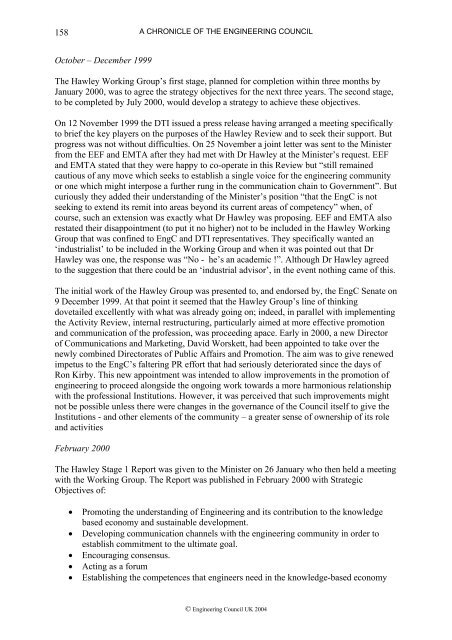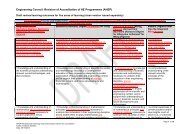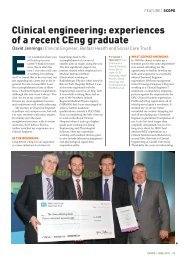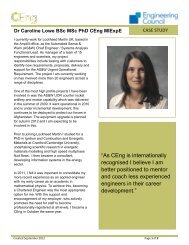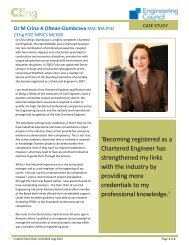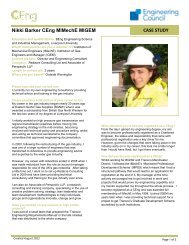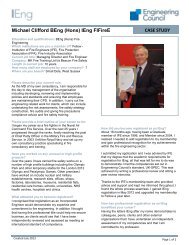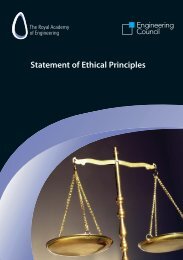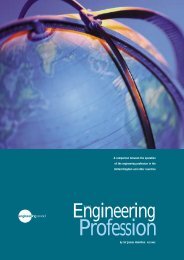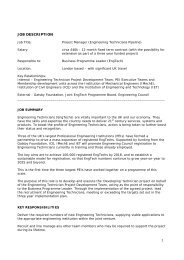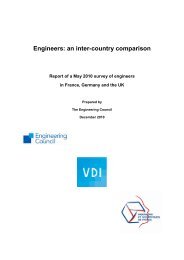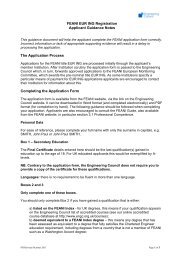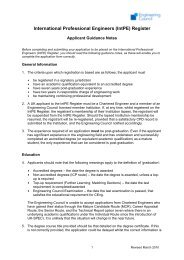An Engine for Change - A Chronicle of the Engineering Council
An Engine for Change - A Chronicle of the Engineering Council
An Engine for Change - A Chronicle of the Engineering Council
Create successful ePaper yourself
Turn your PDF publications into a flip-book with our unique Google optimized e-Paper software.
158A CHRONICLE OF THE ENGINEERING COUNCILOctober – December 1999The Hawley Working Group’s first stage, planned <strong>for</strong> completion within three months byJanuary 2000, was to agree <strong>the</strong> strategy objectives <strong>for</strong> <strong>the</strong> next three years. The second stage,to be completed by July 2000, would develop a strategy to achieve <strong>the</strong>se objectives.On 12 November 1999 <strong>the</strong> DTI issued a press release having arranged a meeting specificallyto brief <strong>the</strong> key players on <strong>the</strong> purposes <strong>of</strong> <strong>the</strong> Hawley Review and to seek <strong>the</strong>ir support. Butprogress was not without difficulties. On 25 November a joint letter was sent to <strong>the</strong> Ministerfrom <strong>the</strong> EEF and EMTA after <strong>the</strong>y had met with Dr Hawley at <strong>the</strong> Minister’s request. EEFand EMTA stated that <strong>the</strong>y were happy to co-operate in this Review but “still remainedcautious <strong>of</strong> any move which seeks to establish a single voice <strong>for</strong> <strong>the</strong> engineering communityor one which might interpose a fur<strong>the</strong>r rung in <strong>the</strong> communication chain to Government”. Butcuriously <strong>the</strong>y added <strong>the</strong>ir understanding <strong>of</strong> <strong>the</strong> Minister’s position “that <strong>the</strong> EngC is notseeking to extend its remit into areas beyond its current areas <strong>of</strong> competency” when, <strong>of</strong>course, such an extension was exactly what Dr Hawley was proposing. EEF and EMTA alsorestated <strong>the</strong>ir disappointment (to put it no higher) not to be included in <strong>the</strong> Hawley WorkingGroup that was confined to EngC and DTI representatives. They specifically wanted an‘industrialist’ to be included in <strong>the</strong> Working Group and when it was pointed out that DrHawley was one, <strong>the</strong> response was “No - he’s an academic !”. Although Dr Hawley agreedto <strong>the</strong> suggestion that <strong>the</strong>re could be an ‘industrial advisor’, in <strong>the</strong> event nothing came <strong>of</strong> this.The initial work <strong>of</strong> <strong>the</strong> Hawley Group was presented to, and endorsed by, <strong>the</strong> EngC Senate on9 December 1999. At that point it seemed that <strong>the</strong> Hawley Group’s line <strong>of</strong> thinkingdovetailed excellently with what was already going on; indeed, in parallel with implementing<strong>the</strong> Activity Review, internal restructuring, particularly aimed at more effective promotionand communication <strong>of</strong> <strong>the</strong> pr<strong>of</strong>ession, was proceeding apace. Early in 2000, a new Director<strong>of</strong> Communications and Marketing, David Worskett, had been appointed to take over <strong>the</strong>newly combined Directorates <strong>of</strong> Public Affairs and Promotion. The aim was to give renewedimpetus to <strong>the</strong> EngC’s faltering PR ef<strong>for</strong>t that had seriously deteriorated since <strong>the</strong> days <strong>of</strong>Ron Kirby. This new appointment was intended to allow improvements in <strong>the</strong> promotion <strong>of</strong>engineering to proceed alongside <strong>the</strong> ongoing work towards a more harmonious relationshipwith <strong>the</strong> pr<strong>of</strong>essional Institutions. However, it was perceived that such improvements mightnot be possible unless <strong>the</strong>re were changes in <strong>the</strong> governance <strong>of</strong> <strong>the</strong> <strong>Council</strong> itself to give <strong>the</strong>Institutions - and o<strong>the</strong>r elements <strong>of</strong> <strong>the</strong> community – a greater sense <strong>of</strong> ownership <strong>of</strong> its roleand activitiesFebruary 2000The Hawley Stage 1 Report was given to <strong>the</strong> Minister on 26 January who <strong>the</strong>n held a meetingwith <strong>the</strong> Working Group. The Report was published in February 2000 with StrategicObjectives <strong>of</strong>:• Promoting <strong>the</strong> understanding <strong>of</strong> <strong>Engine</strong>ering and its contribution to <strong>the</strong> knowledgebased economy and sustainable development.• Developing communication channels with <strong>the</strong> engineering community in order toestablish commitment to <strong>the</strong> ultimate goal.• Encouraging consensus.• Acting as a <strong>for</strong>um• Establishing <strong>the</strong> competences that engineers need in <strong>the</strong> knowledge-based economy© <strong>Engine</strong>ering <strong>Council</strong> UK 2004


